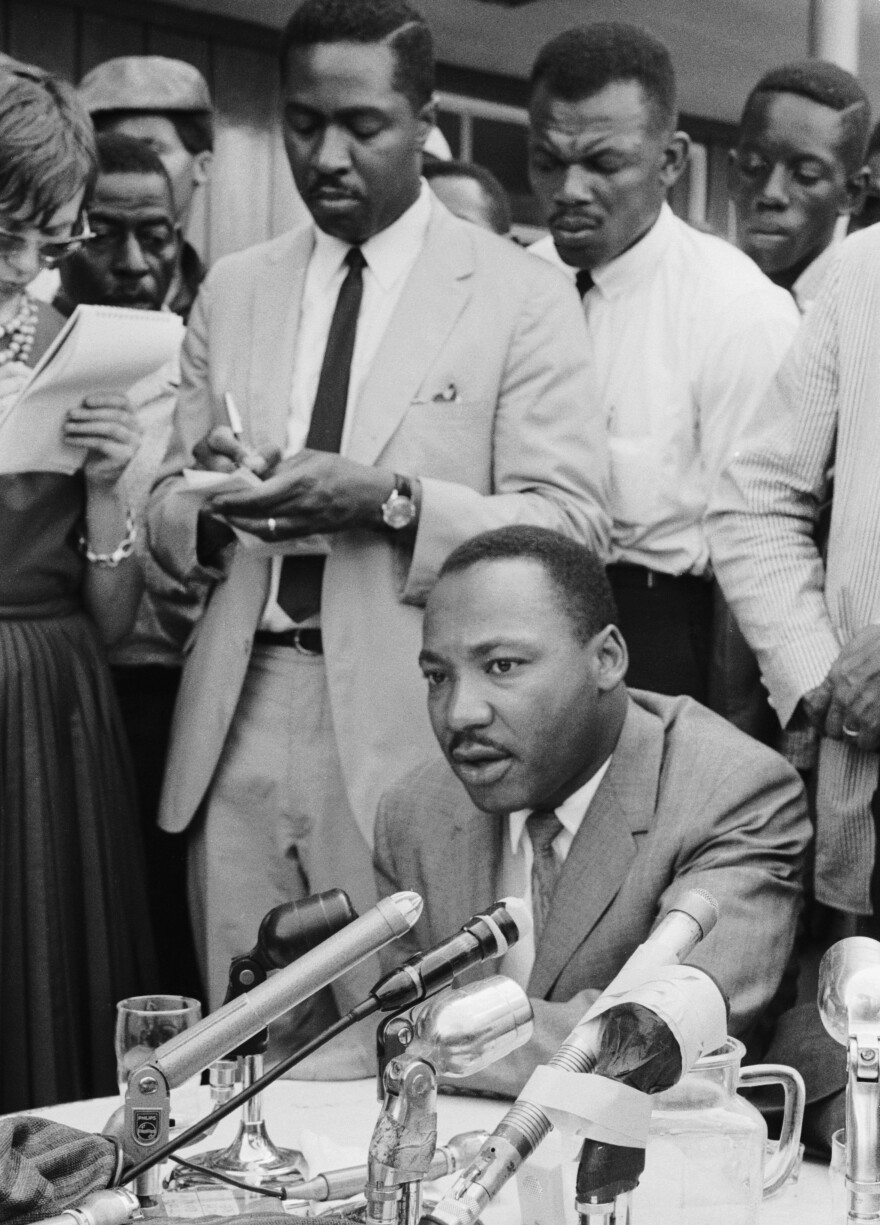For the month of August, Morning Edition and The Race Card Project are looking back at a seminal moment in civil rights history: the March on Washington for Jobs and Freedom, where the Rev. Martin Luther King Jr. delivered his iconic "I Have a Dream Speech" Aug. 28, 1963. Approximately 250,000 people descended on the nation's capital from all over the country for the mass demonstration.
Through The Race Card Project's six-word stories, we'll meet some of the people who witnessed that history and hear their memories and reflections on race relations in America today.
This is the second in a two-part report about Clarence B. Jones and the March on Washington.
Aug. 28, 1963, was a tense day for Clarence B. Jones. As the longtime attorney and adviser for the Rev. Martin Luther King Jr., Jones had a long list of worries as people started to fill the streets around the monuments on the National Mall. Were the right permits filed? Would the speakers veer off script? Would enough people show up?
"I had this feeling that we were going to throw a big party and nobody comes," Jones recalls.
But people did come — at least 250,000 of them. Still, Jones also worried that the crowd might also include agitators, "some of what I called 'agent provocateurs' — white as well as black," Jones says. "I didn't know whether some of the black nationalists who were opposed to Dr. King's non-violence, or whether some of the people from the right wing, the Klan ... would provoke something."
And then there was the delicate and thorny issue of wrangling all those celebrities, Jones says, like Marlon Brando, Shelley Winters, Sidney Poitier, Joanne Woodward, Paul Newman, Joan Baez, Odetta and Bob Dylan, to name just a few.
In the end, things went smoothly, from the singers and the speakers to the big crowds and blue skies. After sleepless nights and fretful days, Jones was able to take his place on the stage at the Lincoln Memorial and take it all in.
'Tell 'Em About The Dream!'

Among his most vivid memories is singer Mahalia Jackson at the microphone, Jones says. "How could you not be moved by this woman's voice? You would have to be unfortunately afflicted with some type of muscular disease that would prevent your muscles reacting to what your ear brought to your body."
Of all the entertainers that day, Mahalia Jackson was the singer who had a special hold on King. When King was feeling down, he would speak with Jackson on the phone.
"I guess you would put it now as 'telephone gospel therapy,' " Jones says. "And he would speak to Mahalia Jackson and he would say, 'Mahalia, please sing to me. I'm having a rough day today.'
"And she would sing one or more of his favorite songs, and ... he would close his eyes listening to her," Jones continues. "In some cases, tears would come down his face and then he would say, 'Mahalia, you are giving me the Lord's voice this morning.' "
King had enormous respect for Jackson, Jones says. And because of that, the reverend listened to her when she offered him unsolicited advice while King stood at the podium on the day of the march.
While he was reading from the prepared text, Jones says, Jackson shouted at King. "This is after she had performed, of course, she's sitting down, and she just shouted at him ... 'Tell 'em about the dream, Martin! Tell 'em about the dream!' "
Jackson knew that King had delivered a rousing speech earlier that summer at Detroit's Cobo Hall, bringing the crowd to a feverish pitch when he preached about his dream for a better America. So despite King's prepared script that August day, Jackson encouraged him to bring that moment from Detroit to the steps of the Lincoln Memorial.
"Now, most people probably didn't have the slightest idea what Mahalia was yelling to Dr. King," Jones says. "What he did upon hearing that, he took the text of the speech — the written text that he was reading — and he moved it to the left side of the lectern [and] grabbed the lectern with both his hands.
"And I see this and I turn to the person standing next to me ... and I said, 'These people don't know it, but they're about ready to go to church.' "
Six Words And The Letter From Birmingham Jail
Jones is proud of his contribution to that moment in history, but he still wishes more of King's dream will be realized in his lifetime. He says he's tremendously proud of progress that's been made. But, as Jones wrote in his book, Behind The Dream, as long as there's a need for a legal category for hate crimes, police officers "pulling over African Americans because they're driving cars considered out of their financial reach," and people "selling their houses because too many black families have moved in," the dream remains diluted, tarnished and unfulfilled, he says.
When asked about his thoughts on race today, Jones harkened back to the letter King wrote from inside the jail in Birmingham, Ala., in 1963. King scribbled out that letter on scraps of paper and it was Jones who secreted those scraps out of the building during several visits. In the letter, published under the headline, "Why We Can't Wait," King said complacency and hate were the enemies of progress.
So, when asked to offer his six words on race, Jones replies, "Hate is why we cannot wait."
Copyright 2021 NPR. To see more, visit https://www.npr.org.

